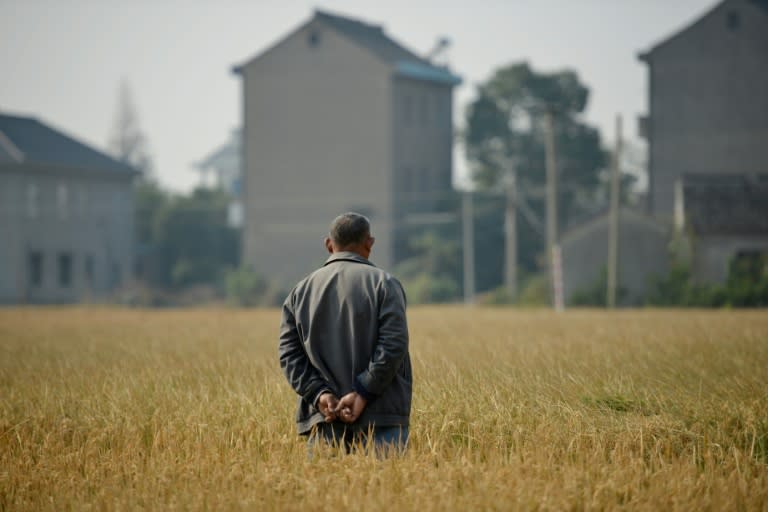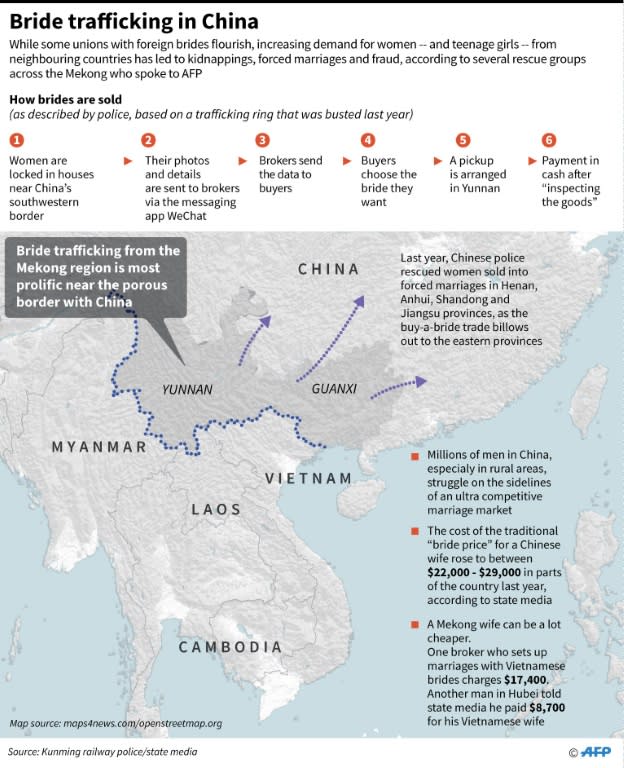Life on the shelf: China's bachelors saving face, cash with Mekong brides
Divorced, in his 40s and fearing a solitary future, Zhou Xinsen went online like thousands of other Chinese men to find an affordable and fast solution to bachelordom -- a Vietnamese bride. He was among millions of his gender struggling on the sidelines of China's ultra competitive marriage market, where a decades-long one-child policy and sex-selective abortions of daughters has resulted in a massive gender gap. "It's very hard for people my age to find a Chinese wife," 41-year-old Zhou says. Single men, many in remote rural villages, are known as "bare branches", a pejorative term in a country where pressure to marry and extend the family tree is sharp. Running out of time, Zhou forked out nearly $20,000 to find his second wife -- a 26-year-old from Vietnam who he relocated to Jiangsu province. "For people my age, time is bought with money." Having fixed his romantic quandary, Zhou then opened his own match-making business, taking a small slice from China's multi-million-dollar annual trade in overseas brides. He charges around 120,000 yuan ($17,400) to connect Chinese men with Vietnamese brides via his website, which shows photos of women aged 20-35 "waiting to be married". It's "profitable", he says, remaining coy on the amount of money he has made. A portion of the money from matches is meant to be funnelled back to families in poor Mekong area countries. While many unions flourish, others quickly lurch into crisis with women disappointed at swapping village poverty in Cambodia, Laos, Vietnam and Myanmar for life in rural China. China's single men are often older, divorced, disabled or too poor to pay the traditional "bride price" -- a dowry in gifts or cash -- for a Chinese wife. Those costs rose to between $22,000-29,000 in parts of the country last year, according to state media. Problems start when the brides feel duped about what they are getting into, says Zhou, who sends a monthly remittance to his wife's family of $175 as a show of goodwill. "This is nothing to us, but for them it's lifesaving," he adds. - Family business - Chinese men face a barrage of economic, psychological and cultural pressures to find a wife, says Jiang Quanbao, a Professor at Xi'an Jiaotong University's Institute for Population and Development Studies. "Marriage is not only a personal matter, it concerns an entire family... especially the parents," Jiang told AFP. As women -- especially in the cities -- push back marriage while they work, study and enjoy single life, China's villages are fast losing their female population. Sons left unmarried become an issue of family "face" in tight village communities, says Jiang. That crushing social expectation has driven a grim trade in brides. Increasing numbers of women -- and teenage girls -- from neighbouring countries are kidnapped, tricked or forced into marriage, according to several rescue groups across the Mekong who spoke to AFP. "Buying a woman who has been kidnapped becomes a kind of hopeless choice," Jiang adds. Last year Chinese police rescued women sold into forced marriages in Henan, Anhui, Shandong and Jiangsu provinces, as the buy-a-bride trade billows out to the eastern provinces. - Crime and deception - Under Chinese law, the abduction and trafficking of women or children is punishable by five to ten years jail. But critics say the law needs updating as the trade surges. "It's extremely profitable and there's no incentive at all for traffickers to stop," Mimi Vu of the Vietnam-based Pacific Links Foundation, which works to prevent human trafficking. "The demand is there and the money, the profit is there to be made." Beijing switched from a one-child to a two-child policy in 2016, but experts say it may take decades to see a rise in the number of women of marriage age. That means the bride trade is unlikely to dissipate anytime soon. Zhou describes his work as "a public service" in a country where there are 33 million fewer women than men. But the outcomes for Chinese men are often far from perfect, with money warping motives throughout the system. Cautionary tales -- of dodgy brokers, trafficked women and brides pocketing money then fleeing -- abound on Chinese social media as the market widens. "It is an industry, and many of them (marriages) are fraudulent," one Weibo user wrote recently. "It's time the government takes care of this business." Another man in Hubei told state media he paid a broker $8,700 to meet a young Vietnamese woman who left him after three months, later aborting their baby as she went on the lookout for another husband. "Now I have neither a wife nor the money," he told the Chutian Metropolis Daily. "I'm a laughing stock in the village."






